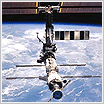A waste of space: Ongoing technical failures leave doubts about the future of Russia’s space program

(Moscow News – themoscownews.com – Kristen Blyth – November 19, 2012)
What would you do with a billion dollars? You could buy Twitter. You could purchase a flight to space for 11 of your closest friends. Or, if you’re Russia, you could waste a sum equal to the GDP of Western Sahara on satellite malfunction and that’s not even counting lost labor hours.
Roskosmos, the Federal Space Agency, announced last Thursday that a severed communications cable outside Moscow, which provided a connection to many civilian satellites plus the Russian section of the International Space Station, had been repaired. The cable was accidentally severed by construction workers who were dismantling equipment at the site. Roskosmos spokesman Alexei Kuznetsov said that the incident did not disrupt interaction with the satellites.
The blunder is the latest in a series of embarrassing technical difficulties plaguing the Russian space program over the last three years. Some highlights of the ongoing disaster include August 2011, when control malfunctions caused the loss of two satellites in a single month, and November 2011 to January 2012, which saw the spectacular crashes of the Phobos-Grunt Mars probe and the Meridian-5 communications satellite.
Six accidents have resulted in the loss of nine satellites and nearly 30 billion rubles since 2010, indicating deep problems in the industry that was once the pride of the Soviet Union.
Kickbacks and poor quality
The root cause appears to be twofold. Corruption, surprising to no one, is first to blame. Russia’s chief military prosecutor, Sergei Fridinsky, told Rossiiskaya Gazeta in 2011 that one-fifth of the country’s state defense budget is stolen every year by corrupt contractors and dishonest officials.
The allegation seemed extreme at the time, but was backed up by some concrete evidence this month. The Interior Ministry has accused senior officials at Glonass, Russia’s satellite navigation system, of embezzling 6.5 billion rubles ($200 million) from program funding. Glonass’s chief designer, Yury Urlichich, has been fired, and criminal cases are pending against several others.
The other major issue with the space program is lack of quality control. Russia removed military oversight of the space industry in 2010, leaving each satellite development company to establish its own methods of supervision. Many simply hired back the same inspectors to their own payrolls, said James Oberg, a writer and expert on the Russian space program. “These former military inspectors are now paid by civilian companies. The greater the amount of hardware shipped, the bigger their bonuses will be. Thus they have become reluctant to make a fuss if a fault is found with a rocket or satellite,” Oberg wrote in an analysis for Aerospace America.
In an industry that is responsible for 40 percent of global space launches, the recent failure rate is alarming. Russia’s launch success rate has dropped below 90 percent, and the implications haven’t gone unnoticed. Roskosmos head Vladimir Popovkin told science and technology students at a recent lecture that substantial reform is needed. “Unless we undertake extreme measures, the sector will be uncompetitive within three to four years,” Popovkin said.
2030: A Space Odyssey
Government officials are brimming with suggestions for improvement, from restructuring to hiring of new staff. Prime Minister Dmitry Medvedev has meanwhile advised that Roskosmos groups, as individual legal entities, should be held financially liable for failures.
Deputy Prime Minister Dmitry Rogozin thinks that a challenge would help inspire the lagging industry. “I propose we take on a supertask, something that today may even seem slightly fantastic for example, the construction of a lunar base. It will be the basis for further breakthroughs,” Rogozin told Rossiiskaya Gazeta in September.
Meanwhile, Russia remains committed to grandiose hopes for the future of its space sector. Roskosmos released a “Strategy for the Development of Space-Related Activities to 2030” in April 2011. The report included plans for deployment of research stations on Mars, as well as probe exploration of Venus and Jupiter. The organization expects to expand to such a degree that it will meet 95 percent of civilian and military needs in 2030, compared to the 2011 level of 40 percent.
Domestic experts remain divided on the issue. Some think that the Russian space program will recapture the glory it enjoyed in its heyday. Others believe the program is doomed and will continue to decay from the inside. Either way, Russia’s path toward the final frontier remains a thorny one for the time being.
